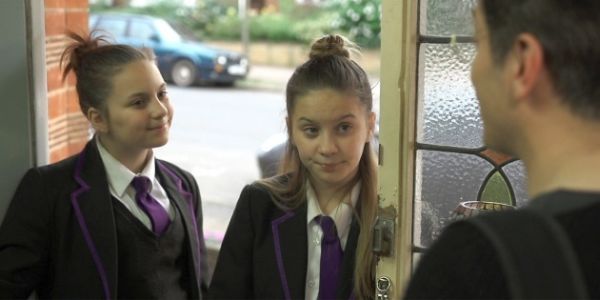A DOZEN SUMMERS: Charming But Aimless

Alistair is a 25 year old writer based in Cambridge.…
Low budget productions always have to come to terms to the fact they are not going to be able to offer proper cinematic spectacle on a minuscule budget. A Dozen Summers instead opts to be as deliberately amateurish as possible, giving it the distinctive feeling of a movie that the twelve year old protagonists would not only wish to make, but would be capable of making. It feels aimless, rambling at even a brief 82 minutes (eight of which are dedicated to elongated end credits), but proves near impossible to dislike despite all of its clear faults. The film is a clear charm offensive, proving that having characters who are likable helps to ensure a forgiveness towards the problematic elements in both the acting and directing.
A “hangout movie”
Rather unusually for a kids movie, A Dozen Summers operates as what Quentin Tarantino would call a “hangout movie”- a film like Dazed and Confused with no clear plot or narrative structure, but one that you make repeat visits to for a fondness towards the characters. I highly doubt I will be making a repeat visit to A Dozen Summers, but as young audiences are frequently portrayed as impatient and in constant demand of action, director and star Kenton Hall should be commended for making a film that avoids the narrative structures the desired target audience will be used to.
The narrative here is about 12 year old twin sisters Maisie and Daisie (played by Hall’s real-life daughters Scarlet and Hero) and the trials and tribulations of both their school and home lives. Hall portrays their father in the film and naturally gives himself the best role – although as he is always playing against unprofessional actors here, it is to his credit that his comically-winning performance doesn’t just seem good by comparison.

The child actors here all give awkward performances, but it actually gives a sense of likability – after all, at twelve years old, it would be strange if you were feeling confident in front of the camera. Every stilted line of dialogue works in the film’s favour as it helps give a sense that this is nothing more than a home-movie project that has grown in scale to involve friends as well as family, who wanted nothing more than to be involved in something that seemed so fun. Rather than feeling self-indulgent and rife with in-jokes only the Halls would understand, the film tries to be as broad as possible for the target audience, offering a depiction of pre-teen life so generic it is likely to be similar to the life experiences of viewers of all ages. This eventually works against the film, as its aimlessness gets the better of it, eventually proving to be as generic as the lives its portraying, despite the best attempts of everybody involved. The famous saying is that you can’t adopt a whole life into a neat three act structure – A Dozen Summers proves you can’t even adapt a few days in somebody’s life into one either.
An arthouse movie – but for kids!
On the positive side, the movie is saved from social-realism purgatory by the rather bizarre conceit that they have forced a cameraman shooting another movie to follow them and document their lives, allowing them to break the fourth wall and stereotypical narrative conventions whenever they feel like it at a simple click of a finger. This technique ensures that whilst it still has the low-budget charm of a home movie the family made with a group of friends, it captures a sense of structural chaos that will stop many younger viewers getting bored; even when nothing happens, breaking the fourth wall allows for a plethora of cutaway jokes, albeit of the hit-and-miss variety.

Like most of the movie, it is something that eventually grows tiresome, with these cutaway gags increasing in length as the movie progresses, forgetting that the secret of comedy is timing, as you suspect Hall is elongating everything in order to make sure the film registers as feature length. The movie is funniest when it makes jokes about subjects no other kids film would touch – we kick off with the narrator being heckled as a potential paedophile, with later references to menstruation and lesbianism, all of which are tastefully done, but seem funny due to how bizarre it is to see them in a kids movie context in plain sight, not hiding behind any innuendos.
A Dozen Summers is surprisingly reminiscent of Me and Earl and the Dying Girl, due to the self-aggrandising narration and the love of arthouse cinema shown throughout – as well as the fact what little narrative there is focuses on the twins starring in a movie. The arthouse cinema love is shown through cutaway jokes; the first references The Shining (but loses points for including the soundtrack to Psycho instead), whilst the second is an unnecessarily long Seventh Seal dream sequence. Me & Earl was advertised in the UK as being a drama in the same vein as The Fault in Our Stars, which made me wonder how 12-year-old girls would react to a film about an egocentric nerd with a passion for Werner Herzog impressions.
A Dozen Summers at the very least doesn’t treat arthouse cinema as some hipster in-joke, nor does it reference it extensively – as a young girl’s first exposure to arthouse cinema, both in the structureless narrative and the frequent movie references, you could do far worse than this. It is far better at adapting to art film demands than it is those of the mainstream; the sole action sequence, a bicycle chase with some bullies, is laughably anti-climactic.
Conclusion
A Dozen Summers is far from perfect, but does have an infectious likability that ensures no amount of bad acting or bizarre filmmaking decisions will keep you from watching until the end.
Have you seen A Dozen Summers? What are the best films to get young audiences interested in arthouse cinema?
A Dozen Summers had a limited UK release back in August. All release dates can be found here.
(top image source: Ballpark Film Distributors)
Does content like this matter to you?
Become a Member and support film journalism. Unlock access to all of Film Inquiry`s great articles. Join a community of like-minded readers who are passionate about cinema - get access to our private members Network, give back to independent filmmakers, and more.
Alistair is a 25 year old writer based in Cambridge. He has been writing about film since the start of 2014, and in addition to Film Inquiry, regularly contributes to Gay Essential and The Digital Fix, with additional bylines in Film Stories, the BFI and Vague Visages. Because of his work for Film Inquiry, he is a recognised member of GALECA, the Gay & Lesbian Entertainment Critics' Association.













